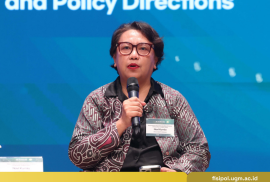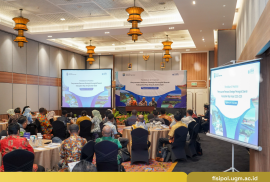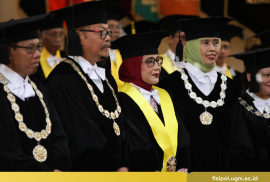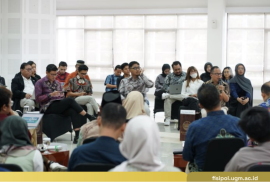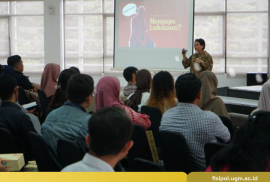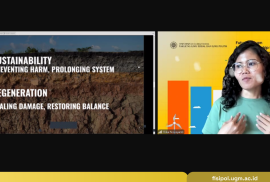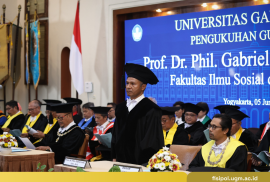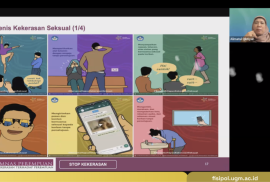Seoul, June 26, 2025 — As the urgency of the climate crisis continues to intensify, the global community faces a growing obstacle: the spread of misinformation and disinformation that hampers public understanding and concrete climate action. At the prestigious 9th Climate Energy Summit held in Seoul, South Korea, Dr. Novi Kurnia, a lecturer in the Department of Communication Science at FISIPOL UGM and lead researcher at the Centre for Digital Society (CfDS) UGM, delivered a keynote address offering a critical perspective from the Global South on the rampant spread of climate-related falsehoods.
News
Yogyakarta, June 27, 2025 — A strong commitment to fostering adaptive and visionary governance was once again demonstrated through the implementation of a Strategic Planning Training Program (Diklat Renstra) for regional government agencies of Raja Ampat Regency for the 2025–2029 period. The program was held in Yogyakarta from June 24 to 26, 2025.
The opening ceremony was marked by a warm and collaborative atmosphere, attended by the Vice Regent of Raja Ampat, Drs. Mansyur Syahdan, M.Si.; the Dean of FISIPOL UGM, Wawan Mas’udi, S.IP., MPA, Ph.D.; and the Chair of the Board of Experts of the Center for Capacity Development and Cooperation (PPKK) at FISIPOL UGM, Prof. Gabriel Lele. Participants included representatives from various regional departments within the Raja Ampat government.
The Faculty of Social and Political Sciences (FISIPOL) at Universitas Gadjah Mada (UGM) once again demonstrated its commitment to supporting the national university admissions process by serving as one of the official venues for the 2025 UGM Entrance Examination (UM UGM) Computer-Based Test (CBT). The examination is scheduled to take place over four days, from July 2 to July 5, 2025.
As one of the designated test locations in Yogyakarta, FISIPOL UGM has prepared two exam rooms—the 4th Floor Auditorium and the East Seminar Room—with optimal arrangements to ensure the smooth and orderly execution of the test. The examination is conducted in two sessions daily: the morning session runs from 07:30 to 11:45 WIB, while the afternoon session takes place from 13:00 to 17:15 WIB. On Friday, the afternoon session starts at 13:45 and ends at 17:00 WIB.
Yogyakarta, 19 June 2025–The history of the development of international relations with the Middle East shows the identity and alignment of Indonesia’s foreign policy. Consistency over the years reflects the strong solidarity of the past and present governments, especially in the Palestinian conflict. Prof. Dr. Dra. Siti Mutiah Setiawati, M.A., Professor of Middle East Geopolitics, Faculty of Social and Political Sciences, Universitas Gadjah Mada, raised the issue in her speech on Thursday (19/6).
Yogyakarta, June 19th 2025 – Bulaksumur Roundtable Forum (BRF) was held again through The Clinics series which this year focused on the theme “Opportunities for Zakat, Infaq, Sadaqah, and Waqf (ZISWAF) to Build Participative Climate Finance in Indonesia”. Located at the 4th Floor Auditorium of FISIPOL UGM, this forum became a forum for cross-sector discussions to explore the potential of social funds as an instrument of inclusive and sustainable climate crisis financing. The forum presented a variety of speakers from philanthropic institutions, Islamic finance, to government agencies. Some of them were Syamsul Ardiansyah (Senior Officer of Strategic Alliance Dompet Dhuafa), Dede Haris Sumarno (Commissioner of Supervision and Governance of the Indonesian Waqf Board), and Nur Fadilah (ESG Operation and Communication Head of Bank Syariah Indonesia). In addition, the forum also involved academics and climate policy experts to enrich perspectives.
Yogyakarta, June 17th 2025—A professor from UGM’s Department of Communication Science published an introductory book regarding the theory of Niklas Luhmann as an eye-opening perspective in the field of communication science. Prof. Dr. Phil. Hermin Indah Wahyuni organized a discussion with several communication science experts from Universitas Padjadjaran titled “Titik Balik: Teori Sistem dalam Ilmu Komunikasi” on Tuesday (17/6).
Niklas Luhmann is a German sociologist who discovered the systems theory. Luhmann was inspired by Talcott Parsons theory of the social system, which aims to answer the many questions that society faces in regards to social change. It is the development of this theory that is explained as the Luhmann systems theory, in which the social system is not shaped through mutual agreement, moreso through conflicting disagreement. Without difference of opinions, there won’t be interaction between social actors and therefore, a system will not be formed.
Yogyakarta, June 13th 2025—In an ever-changing world faced with many social, environmental, and economic challenges, a big question arises: What if businesses are not just profit-oriented, but also think about the impact? This question became a very intriguing introduction in the opening webinar for the 9th Batch of the C-Hub Talent Pitching, a yearly program which pushes the spirit of social entrepreneurship among youths. Bringing the theme of “Future-Fit”, this program is back again with new spirits in placing inclusivity and sustainability as the main foundation for building a brighter future. In the webinar titled “Future-Driven Entrepreneurship for a Sustainable Tomorrow”, Fisipol UGM’s Creative Hub presented two inspirational speakers, none other than Satya Dewastra B. W., founder of Ailesh, and Rika Novayanti, expert strategic communication on environment, as well as the Co-founder of Mosaic.
Yogyakarta, 11 June 2025–Prof. Dr. Phil. Gabriel Lele, S.IP., M.Si, Lecturer of Public Policy and Management, was officially inaugurated as Full Professor of Public Policy Governance on Thursday (5/6). The issue of democracy is one of his concerns about the country’s socio-political conditions. Through his speech, entitled ‘Democracy Beyond Election: Agonistic Public Policy as a Transformation Agenda,’ Gabriel highlighted several trends in the current pattern of democracy, including authoritarianism, populism, and policy uniformity.
Yogyakarta, June 5th 2025 – The Faculty of Social and Political Sciences (Fisipol) of Universitas Gadjah Mada is committed to the implementation of the Law on Sexual Violence (TPKS). In this mission, Fisipol certainly seeks to raise awareness of the prevention of sexual violence by educating all academicians, namely lecturers, education staff, and students. Carrying out this theme, the Department of Sociology of UGM invited the Commissioner of the National Commission on Violence Against Women and the Task Force for the Prevention and Handling of Sexual Violence (PPKS) UGM on Thursday (5/6).
Yogyakarta, June 4th 2025—Challenges faced in the workplace not only encompass the issue of the job market, but also the issue of the shifting transition regarding job prosperity and social issues that are directly affected by the development of modern technology. With that in mind, UGM’s Department of Social Development and Welfare (PSdK), as part of the Faculty of Social and Political Science of Universitas Gadjah Mada, decided to organize a discussion at the Self Development Series titled “Social Work Without Borders” on Wednesday (4/6).

